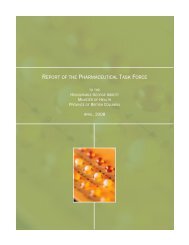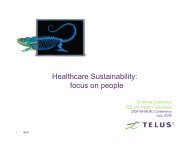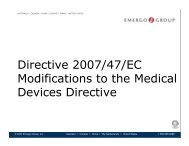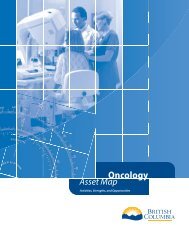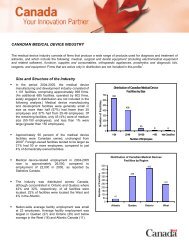Clinical Trials and Preclinical Infrastructure Asset Map - Life Sciences
Clinical Trials and Preclinical Infrastructure Asset Map - Life Sciences
Clinical Trials and Preclinical Infrastructure Asset Map - Life Sciences
Create successful ePaper yourself
Turn your PDF publications into a flip-book with our unique Google optimized e-Paper software.
262<br />
BRITISH COLUMBIA<br />
APPENDIX 9. Healthcare Research Centres (cont’d)<br />
RESEARCH CENTRE/ URL CONTACT DESCRIPTION<br />
Down Syndrome<br />
Research Foundation<br />
(DSRF)<br />
http://www.dsrf.org/<br />
B.C. Mental Health <strong>and</strong><br />
Addictions Research<br />
Institute (BCMHARI)<br />
www.mhanet.ca<br />
Centre for Addictions<br />
Research of B.C.<br />
www.carbc.ca<br />
1409 Sperling Avenue<br />
Burnaby B.C. V5B 4J8<br />
Tel: 604-444-3773<br />
Toll-free in Canada at 1-888-464-<br />
DSRF<br />
Fax: 604-431-9248<br />
Contact: Naznin Virji-Babul, Director,<br />
Research<br />
naznin@dsrf.org<br />
B.C. Mental Health <strong>and</strong> Addictions<br />
Research Network<br />
PHSA Research <strong>and</strong> Networks<br />
Suite 201-601 West Broadway<br />
Vancouver B.C. V5Z 4C2<br />
info@mhanet.ca<br />
Tel: 604.707.6390<br />
Fax: 604.707.6399<br />
Contact:<br />
Jane Hood Network Director<br />
Tel: 604.707.6393<br />
University of Victoria<br />
Technology Enterprise Facility<br />
Room 273 2300 McKenzie Ave<br />
Victoria B.C. V8P 5C2<br />
Tel: 250-472-5445<br />
Fax: 250-472-5321<br />
carbc@uvic.ca<br />
Contact: Timothy Stockwell, Director<br />
timstock@uvic.ca<br />
Tel: 250-472-5445<br />
DSRF initiates <strong>and</strong> participates in research that provides insight into the unique learning style of Down’s Syndrome individuals. Data<br />
collected is analysed <strong>and</strong> pilot interventions <strong>and</strong> educational programs are developed <strong>and</strong> offered. These programs test the underst<strong>and</strong>ing<br />
of the brain <strong>and</strong> are evaluated to observe the impact on DSRF students. Even the slightest increase in cognitive ability, the objective that<br />
drives our work, can make a significant difference in the level of support an individual with an intellectual disability may require.<br />
DSRF specialises in imaging brain activity through magnetoencephalography (MEG). MEG records the magnetic fields in the brain using<br />
sensitive devices called SQUIDs (Superconducting Quantum Interference Devices). MEG installed at DSRF has a whole cortex capability<br />
BCMHARI aims to build capacity <strong>and</strong> promote networking among the diverse nodes in mental health research. In the addictions field,<br />
the Network is partnering with the Centre for Addictions Research of B.C. (CARBC), <strong>and</strong> will aim to further exp<strong>and</strong> the partnerships <strong>and</strong><br />
infrastructures that have been initiated across the province.<br />
BCMHARI Network has provided funding to develop four Research <strong>and</strong> Knowledge Transfer Hubs:<br />
• Alcohol <strong>and</strong> Drug Monitoring Hub: aims to describe the main patterns of alcohol <strong>and</strong> other drug use <strong>and</strong> related harms in B.C..<br />
• <strong>Clinical</strong> Research Hub: is designed to assist researchers in the selection <strong>and</strong> employment of measures to assess cognition, substance use,<br />
<strong>and</strong> severe psychopathology.<br />
• Community Based Research Hub: aims to increase capacity for CBR in mental health <strong>and</strong> addictions by providing access to CBR-specific<br />
training, resources, <strong>and</strong> networking opportunities.<br />
• Pharmacoepidemiology Hub: is a resource for researchers interested in using B.C.’s prescription database, PharmaNet, to study patterns of<br />
utilization of pharmacological agents in the treatment of mental illness <strong>and</strong> addiction.<br />
CARB is a provincial research network involving a partnership of SFU, Thompson Rivers University, the UBC, the UNBC <strong>and</strong> UVic, <strong>and</strong> administered<br />
by UVic. Advances public policy on substance use, harm reduction, <strong>and</strong> addiction issues in B.C. through research that sheds light on<br />
their social, cultural <strong>and</strong> psychological determinants.<br />
CARB core activities include:<br />
• To build research infrastructure <strong>and</strong> capacity across B.C. for the conduct of research that will increase underst<strong>and</strong>ing <strong>and</strong> support more<br />
effective responses to substance use<br />
• To conduct high-quality research that increases underst<strong>and</strong>ing of substance use <strong>and</strong> addiction, <strong>and</strong> informs effective responses<br />
• To disseminate research findings that increase underst<strong>and</strong>ing of substance use <strong>and</strong> addiction in order to increase awareness of related<br />
harms <strong>and</strong> to identify effective responses<br />
• To contribute to the implementation of evidence-based policy <strong>and</strong> practice.






